
Professional Romanian plumbers in London, UK. Call 07725055560 for further information. Romanian Plumbing and Heating retailer in London.
Online Plumbing Shop Acton – plumbingshop.org.uk
Plumbers in London

Professional Romanian plumbers in London, UK. Call 07725055560 for further information. Romanian Plumbing and Heating retailer in London.
Online Plumbing Shop Acton – plumbingshop.org.uk
Central Heating Finchley Plumbers in Finchley
London plumbers Robuild, offer a complete plumbing service in Finchley area for all your plumbing needs. Central Heating, Boilers repairs and installation, Underfloor Heating, Mobility bathrooms, Bathrooms, Kitchens, Showers, Wet Rooms,Gas appliances, new bathrooms, Megaflow Plumbing System,Combination boilers, Boiler servicing.

Our plumbers are Gas Safe registered ( also known as Corgi ) We also cover Woodside Park area. Our builders, painters & decorators, electricians, gardeners and carpenters cover North London and Finchley – Woodside Park area.
Plumbing pipes
When lead and steel pipes went out of fashion and copper and plastic came in, it became possible for householders to tackle simple alterations and repairs to the domestic water supply. For plastic tubing there is only one technique to learn: how to join tubes. Plastic won’t bend far with safety, so any bends are best made by using angle fittings . For copper tube you need to learn how to make joints and how to bend tubes. All the techniques are simple, but it’s best to order an extra length of tube and an extra fitting or two and practise before you tackle the real thing.
Copper tubing and how to bend it into shape
If copper tube is bent more than a small amount it will become oval in section and eventually flatten completely. To avoid this, plumbers use bending springs or bending machines which keep the tube section round. Bending machines are
not worth buying, but you can hire them. Springs can be bought or hired; they are steel spirals about 2ft. long. The easiest kind to use fits round the outside of the tube – it’s easier to slip on to the correct position and take off again after bending. Internal springs which slip inside the tube are more commonly available.
With the spring in place you simply grip the two ends of the tube, set your knee against the place to be bent, and pull. With the tube bent, internal springs tend to jam inside. If the bend is at the end of a tube, so that part of the spring is sticking out, slip a screwdriver into the ring on the spring end, twist to wind up the spring a little and the spring will slip out.
If the bend is in the middle of a long tube you’ll have to fasten the spring ring to a strong wire, measure carefully and mark the wire so that you can slide it in to the right position. Bend the tube a little further than you need, then straighten it a little to release the bending spring.
Copper tube bends easily; thicker tubes can be bent by fitting into a hole bored in a piece of timber; press down on the ends.
For smaller tubes, it is enough to hold ends of tube in each hand and bend tube over your knee. Section to be bent must be protected by bending spring or it will flatten and finally collapse.
Bending machines, usually on hand held or on a portable stand, can be hired, make tube-bending easy. The tube is held in a groove so it can’t flatten while being bent.
Copper or plastic pipes full water are heavy and will sag not supported by fittings.
Plastic pipes: for waste, hot and cold water only
Plastic pipes are for hot water, cold water and waste pipes only. They can be bent cold; the manufacturers supply instructions for bending after heating them, but it’s best, where possible, to use the various angle fittings.
Water supply pipes are joined with solvent cement after cleaning the inside of the fitting and outside the end of the pipe with special cleaning fluid. Buy both when you buy the pipes and fittings. The tube ends must be cut square; use a fine-toothed saw, and chamfer the end with a file. After cleaning, paint outside of tube and inside of fitting
with solvent cement, and immediately push pipe into fitting and allow to set. (Work fast or cement will dry before you’ve made the joint.) Wipe off the surplus cement, and wash out the brush immediately in the cleaning fluid. Bigger pipes for waste systems can be joined in the same way, or they can be joined with simple push-on fittings. These have rubber rings inside which grip the outside of the pipes. Cut pipes square, chamfer the ends
Wipe the outside of the pipe with liquid soap. Check that the rubber inserts are seated correctly in their recess in the fitting. Push the pipe home carefully so that it doesn’t displace the rubber ring. Plastic pipes should be kept an inch or so clear of hot pipes if they are running side by side; if they must be close, they should have insulation between them.
Solvent-cement jointing for plastic waste water pipes or for plastic waste pipes. For plastic waste pipes only: pipes push into expansion fittings where rubber inserts seal the joints.
Push Fit pipes and fittings , also called Polypipe or Speedfit are easiest way to work with pipes. DO NOT USE THEM FOR GAS.

You need a plastic pipe cutter, 15mm and 22mm and when you connect them, make sure you don’t damage the internal rubber ring from the fittings. It is used for underfloor heating installations.
Professional plumbers and architects, sometimes avoid using the Polypipes pipes in favour for the more traditional and proved to last longer: copper pipes.
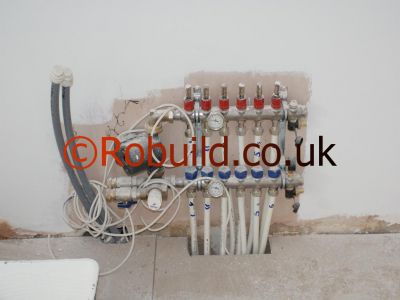
Capillary fittings: the neatest joints
Capillary fittings make the neatest joints and are the only ones for fitting underground which we’d recommend an
amateur to tackle. The design is such that even if you aren’t good at soldering you’ll be able to make a sound joint. There are two kinds of capillary fittings; those where you must add solder and those, easiest for amateur use, which have a ring of solder already fitted inside as an integral part of the fitting.
Cut the ends square of the two tubes to be joined (use a finetoothed hacksaw or miniature hacksaw) and file off any roughness (use a round file for inside).
Thoroughly clean inside of fitting and outside of tube with glasspaper, plumber’s steel wool or the special cleaning tools.
Put flux on outside of tubes and inside of fitting. Push tube into fitting as far as the built-in stop.
Scratch tube with nail at joints to be sure solder grips well. Play the flame of blow-lamp on fitting; solder will melt and creep up the narrow space between tube and fitting (by capillary attraction, hence the name) until you see a bright ring of solder all round the joint.
Compression joints are the simplest for copper
Compression joints are the simplest for joining copper tube; there’s no heating or soldering and the only tools needed
are a hacksaw, file and spanners.

Cut square the ends of tubes and file off any roughness (use a round file to smooth the inside). Slide the nut on the tube, then the compression ring. Push tube into the fitting making sure it reaches the stop ridge inside. Then push the ring into the mouth of the fitting, and tighten as far as you can with your fingers. Use a spanner to give nut another quarter or half turn. Don’t over tighten or the joint may leak. This kind of joint is called non-manipulative; make sure you get the right kind of fittings. There’s a similar looking manipulative joint,which needs a special tool to widen tube ends before joining – not quite so easy for amateurs.
If a joint leaks, tighten a little more with spanner; if that doesn’t cure it, remake the joint with a new compression ring.
Adapters
If your existing plumbing is in lead, you’ll have to pay a plumber to make a lead-to copper joint, and you pick up the job from there. He’s likely to charge you fairly steeply, to make up for this work he’s losing, but you’ll still save money in the end. If your plumbing is in steel tube, unscrew a convenient joint and fit a steel-to copper adapter or T-piece. You can buy these adapters from a plumber’s merchant; buy some PTF tape as well, wrap the steel
thread with the tape, then screw on the adapter and from there on you can work in copper tube. Similar adapters are made for steel to-plastic, permitted only for cold water, hot water and waste pipes.
Boilers for Flats, Boilers for Bungalow, Boilers for Terraced House, Boilers for Semi-detached House, Boilers for Detached House, Boilers for Large House
 Robuild can offer you a guide on getting a new boiler installed or boiler replacement. To be on the safe side, always consult a qualified plumber, Gas Safe Registered plumber or Contact Us, before buying a boiler. It happens very often that our plumbers have to deal with boilers that are too big or too small for the property. Size and power of the boiler does matter, its always better to have a more powerful boiler for a smaller property if you don’t mind spending extra on energy and gas bills. ( Or if you don’t believe in Climate Change ). Robuild Plumbers will always try to recommend the right boiler for you, rather than the most powerful boiler.
Robuild can offer you a guide on getting a new boiler installed or boiler replacement. To be on the safe side, always consult a qualified plumber, Gas Safe Registered plumber or Contact Us, before buying a boiler. It happens very often that our plumbers have to deal with boilers that are too big or too small for the property. Size and power of the boiler does matter, its always better to have a more powerful boiler for a smaller property if you don’t mind spending extra on energy and gas bills. ( Or if you don’t believe in Climate Change ). Robuild Plumbers will always try to recommend the right boiler for you, rather than the most powerful boiler.
IT IS VERY IMPORTANT TO HAVE GOOD WATER PRESSURE to your Flat,Bungalow,Terraced House,Semidetached House,Detached House or Large House. If you have poor water pressure – low water pressure, your options for a Central Heating System Boiler are reduced to a System Boiler, Regular Boilers or Traditional Boilers. OR YOU YOU HAVE TO UPGRADE THE MAINS WATER SUPPLY.
For upgrading the mains water supply or pipe, you need to contact your Water Supplier. From the water meter in the street, a new and bigger pipe will be laid by the plumbers, back into your property. Old pipes are made of lead, unhealthy and should be avoided, upgrading the mains water pipe, means changing to plastic pipes PVC (poly pipes,polybutylene piping). Your Water Supplier will book a date , usually it takes few weeks,and will charge for the service. The processes of changing or upgrading the water supply pipe, looks more or less, like in the picture below.
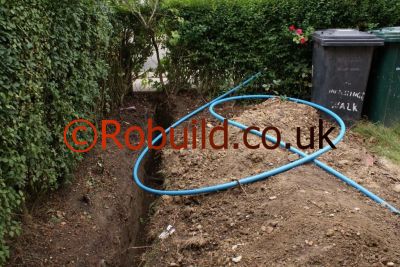
All new boiler installation or boiler replacements requires the boiler to be in the vicinity of an external wall for the gas flue and a 22 millimetre diameter copper pipe for the gas supply pipe. Sometimes the boiler flue can be installed through the roof.

If the boiler location is relatively far from an external wall or roof, inspection chambers needs to be built if the boiler flue pipe is boxed in. However, there is limit for the length of the Boiler Flue Pipe.
Boiler Flue
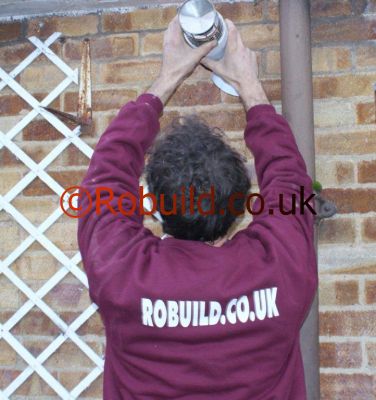
Boilers for Flats
Flats are in general made of one bedroom, two bedrooms , three bedrooms – one kitchen and one bathroom. Some might have one family bathroom fitted with a bathtub and a second bathroom fitted with a toilet WC, basin and sometimes a shower (an electric shower)

The Hot Water and Heat Energy (Calorie) needs for a flat is considered to be of a low requirement. This means a COMBI BOILER ,or COMBINATION BOILER should be the right boiler for a small flat. It is energy efficient and takes a lot less space than a conventional boiler system with hot water tanks, cylinders and cold water reservoirs.
Hot water tank

Boilers for Bungalows
The same rules applies as for Flats.
Cold water tank reservoir in the loft
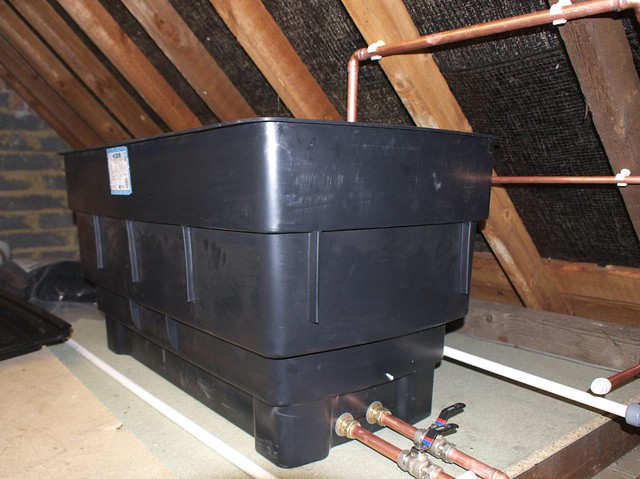
Boilers for Houses
If you have two or more bathrooms, then a Megaflo (megaflow) plumbing system should be right for your property. A MEGAFLO plumbing system is not the boiler itself, it is the unvented hot water tanks that makes the central heating into a megaflo central heating system. The more hot water tanks or bigger hot water tanks you have, it means more hot water available to your bathrooms. If you have to fill two or more bathtubs at the same time, someone taking a shower and the kitchen tap running, you will need a powerful boiler and a megaflo plumbing system to cope with the hot water demands for the property. Just keep in mind that megaflo hot water tanks can take lots of space.
What you see in the picture below is : The boiler, The Megaflo (wrongly written sometimes Megaflow) hot water tanks and a Water Filter.

In the picture below, just a small Megaflo hot water tank unvented central heating system

If you want to save space, you can install a High Flow boiler. For this you need a decent Mains Water Pressure to work, but its the size of a washing machine and there is not need for water tanks. Because of the weight, the boilers are floor standing, but a good builder can install some solid brackets if necessary to support the weight of the boiler.
Highflow boiler
Always ask a Professional Plumber or Contact Us before purchasing a boiler from a plumbing shop in order to make sure your Boiler provides the right amount of hot water output.
Underfloor Heating Installation
Doing away with radiators is not a luxury anymore, underfloor heating is becoming the norm in London. More than 10 years ago, underfloor heating used to be installed in bathrooms and kitchens, nowadays, it is installed for the whole property, house or flats, bedrooms, living rooms, hallways, no matter the size or types of flooring. Underfloor heating can be installed under carpets, floor tiles, wooden flooring, etc.
With proper insulation and if installed correctly, it can be energy efficient too. Having underfloor heating will give you more space and a better interior design, plus, the heating is dispersed in an uniformed way, no more too hot or too cold room temperatures. The underfloor heating can also be appreciated when walking barefooted on the floors.
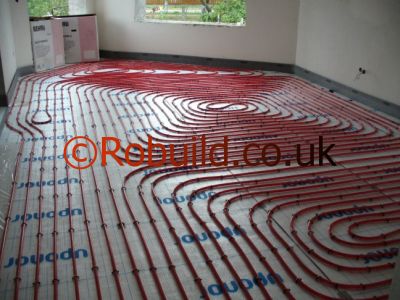
The underfloor heating can be controlled by thermostats and programmers, each room independently from each other if needed.The plumbers will explain to you how it works and how many zones you need for a house or a flat.

Manifolds will need to be installed too, depending on how many zones are you going to have. The heat output (BTU) is calculated by the manufactures, using special software.
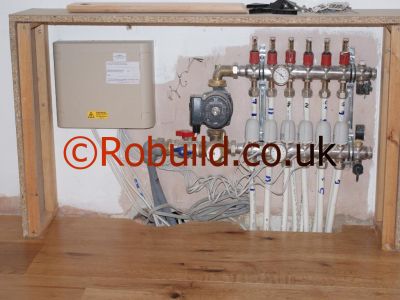
The boiler needs to be adapted and sometimes changed if its not powerful enough. Our London Plumbers will give free advice regarding your Central Heating.
Underfloor Heating Installers in London
Our Plumbers and Central Heating Engineers cover Radlett, Borehamwood, Elstree, Shenley, Aldenham & Letchmore Heath area.
All types of Plumbing And Heating Work, Underfloor Heating, Boilers, Heating And Radiators, Bathrooms, En suites, Showers, wet floor bathrooms , Repairs. Gas Safe Registered plumbers for new boiler installation, Combi boilers, megaflo central heating systems, conventional boilers, gas works.
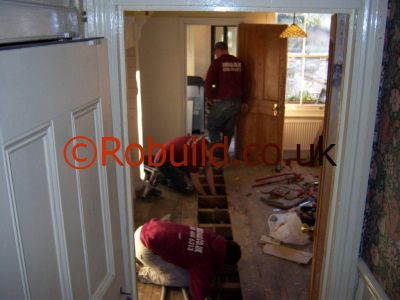
Residential and Commercial Plumbing Services, Robuild Plumbers offer installation of high efficiency boilers.

Contact us for a free quote for your Plumbing and Central Heating Project.
We also offer building , plumbing, electrical, painting and decorating services in your area.
Plumbers in Radlett, Plumbers in Borehamwood, Plumbers in Elstree, Plumbers in Aldenham, Plumbers in Letchmore Heath
Combi-boilers are best for small flats, houses with maximum 2 bathrooms.
Highflow boilers are ideal for lager houses and properties, it can run 3 bathrooms and kitchen at the same time.
Megaflo – you can run a small hotel if you hot water tanks storage are large enough.
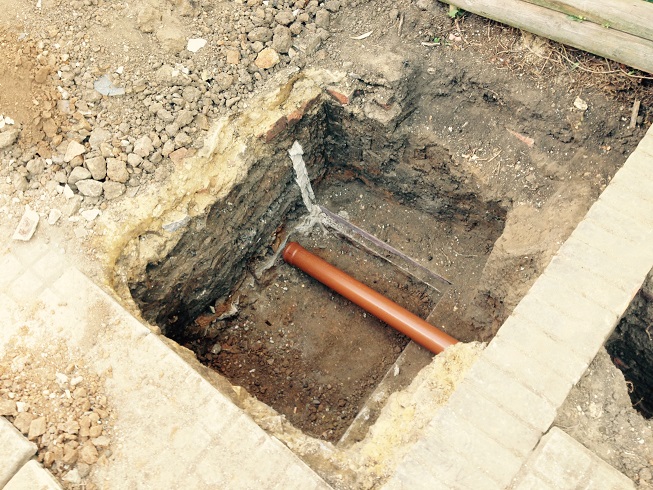



A double seal manhole cover is the cheapest way to deal with a manhole. The best choice is to move it outside, but it will cost minimum £8000 in most cases.
New soil pipe and drain for an ensuite bathroom.

Rodding eye soil pipe – any blockages can be easily cleared
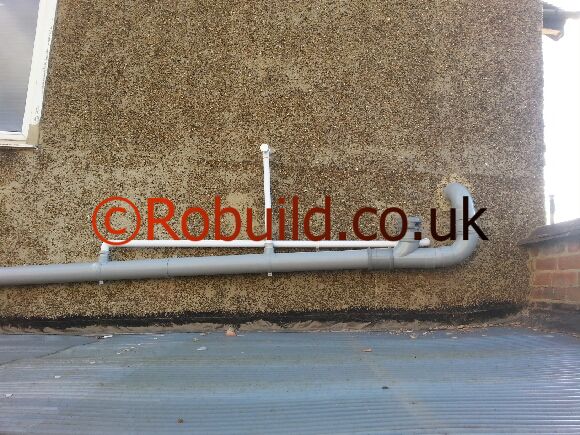
The air vent outlet is fitted to prevent gas building up inside the soil pipe.
Exploding toilets – dangerous bathrooms
The bathroom as we know it is a Victorian invention, but at first, it could be a dangerous place. Besides horrible cases of scalding in the bath, there are even reports that there were incidents of lavatories spontaneously exploding. The reason this might have been possible was that flammable gases such as methane and hydrogen sulphide, emanating from human waste, built up in the sewers and, in early toilets, could leak back into the home, where they could theoretically be ignited by the naked flame of a candle. Changes to toilets – beginning in the late 18th Century and continuing in the Victorian era – sorted the problem of gas leaking.